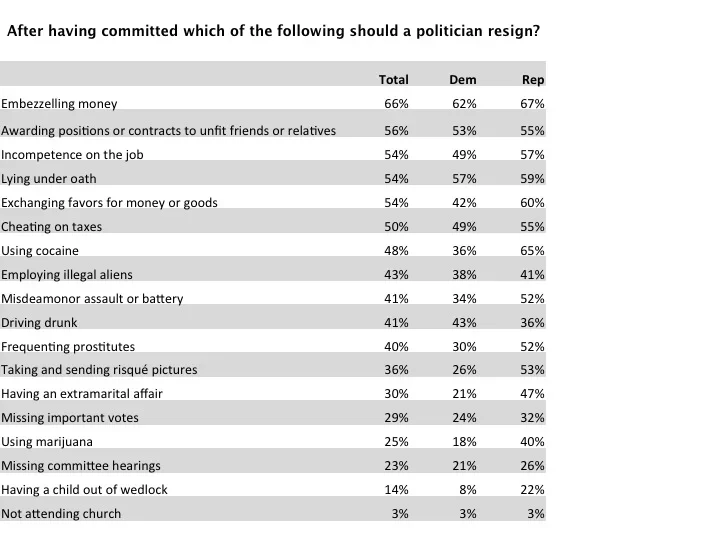The ongoing scandal surrounding Anthony Weiner—a New York Congressman who was caught sending risqué photos via Facebook and Twitter to young women—has raised questions not only about the Congressman’s behavior but also about the conduct of politicians in general.
In a recent survey, conducted June 10 to June 13, 2011, we asked about the scandal. These were the results:
- 61% of our respondents said that Weiner should resign from office. 25% replied that he should stay and 15% were not sure.
- In total, awareness of the scandal was very high: 92% of Americans had heard at least a little about it.
- The percentage of Americans calling for Weiner’s resignation split very clearly across party lines. While 42% of Democrats believed that the Congressman should resign, that number rose to 84% with Republicans.
These results show us very clearly that Americans do not approve of the Congressman’s behavior. They do not, however, tell us for what reason. To probe this question, we asked our respondents about which actions they thought a politician should resign after committing.
- 36% of respondents said a politician should resign after taking and sending risqué pictures, much lower than the 60% calling for Weiner’s resignation.
- 54%, on the other hand, said that a politician should resign after being caught lying under oath, much closer to Weiner’s figure.
- This suggests that the offense at Weiner’s actions comes not just from sending the risqué photos but from also the fact that he lied about sending them, during the first press conferences after the scandal broke.
The results of our survey also revealed a variety of interesting facts about what actions Americans find unacceptable for their political leaders. To examine this, we averaged the results from the questions into four categories—corruption: embezzling money, awarding positions or contracts to unfit friends or relatives, exchanging favors for money or goods; dishonesty: cheating on taxes, lying under oath; illegal drug use: using cocaine or marijuana; sexual misconduct: having an extramarital affair, having a child out of wedlock, taking and sending risqué pictures, frequenting prostitutes.
- Our respondents found actions which denoted corruption (an average of 58%) or dishonesty (53%) more reprehensible than those which represented sexual misconduct (27%) or illegal drug use (30%).
- A split appeared between Republicans and Democrats. Overall, Republicans were less tolerant of any of the actions on the list and roughly twice as many Republicans thought that sexual misconduct or illegal drug use merited a politician’s resignation.
- Republicans and Democrats condemned corruption in equal numbers, however. Those who identified as “liberal” were, in fact, more critical of the actions in our corruption category than those who identified as “conservative”.
- A similar split manifested between older and younger voters. In general, older respondents were less tolerable of any of the actions on our list.
- Older respondents were also more far more critical of sexual misconduct or illegal drug use than younger voters.
Image Source: Press Association










